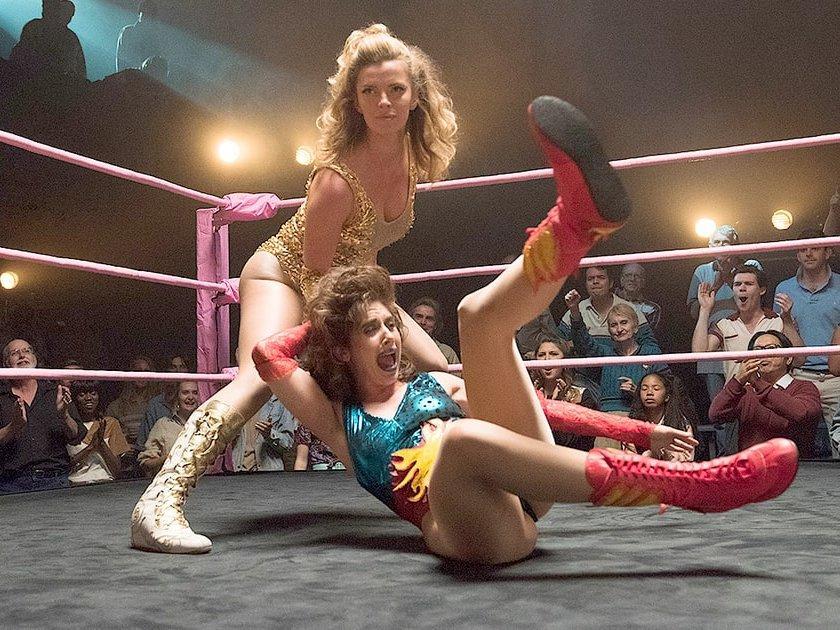Why GLOW is a welcome antidote to slow, sprawling TV shows
The episodic sit-com style of is a breath of fresh air, after the Dickensian complexity we see in many of Netflix’s greatest hits

In the final season of The Wire, there is an episode called “The Dickensian Aspect”. The HBO crime drama, generally considered to be one of the greatest television programmes ever made, explicitly acknowledged the show’s novelistic approach with that title.
While most television up to that point relied on an episodic structure to ensure new viewers were not left perplexed by intricacies of plot, starting The Wire halfway through a season would be akin to opening a book in the middle and trying to make sense of it. It was a bold move, but it ultimately elevated the medium and spawned the likes of Mad Men and Breaking Bad.
The advent of Netflix (and other streaming services), coupled with this new approach, has had an unexpected side effect; more and more shows are taking a leisurely approach to storytelling.
Bloodline, for instance, while undoubtedly worthy of praise, at times felt like watching a car crash in the kind of super-slow-motion usually reserved for a close-up of Cristiano Ronaldo puffing out his cheeks prior to taking a free-kick.
Perhaps the best indicator of this sea change in mentality is Lemony Snicket’s A Series of Unfortunate Events. When the series was adapted for the big screen in 2004, the first three books formed the basis of one film that clocked in at less than two hours. This year’s Netflix version, however, devoted roughly two hours to each novel.
Thank God, then, for GLOW. Or, more accurately, thank Liz Flahive and Carly Mensch, the creators of the show which bucks the trend. The idea for the series came to them when they were trying to conceive a new female-led show, and happened upon a Netflix documentary entitled GLOW: The Story of the Gorgeous Ladies of Wrestling.
Neither had heard of the GLOW wrestling promotion before, but it seemed like the perfect vehicle to explore any number of themes that concerned them. Indeed, the show is as much about the 1980s syndicated women’s professional wrestling circuit as Friday Night Lights was about high school football.
Glow is a brilliant dramedy (or should that be coma? Happily, not in this case...) about a group of women coming together to produce something that, while it might be exploitative, nonetheless gives them a sense of empowerment. That dichotomy is at the heart of the series – but what makes the show really stand apart is the decision to revert to an episodic format reminiscent of the television of the era depicted.
Since it’s a Netflix series, people are unlikely to start in the middle, but the point is that it could be done. Like the great sitcoms of yesteryear, most episodes have self-contained plots and stay lodged in the memory. That said, Friends never did do the one where they get coked up in a Malibu mansion...

Watch Apple TV+ free for 7 days
New subscribers only. £8.99/mo. after free trial. Plan auto-renews until cancelled

Watch Apple TV+ free for 7 days
New subscribers only. £8.99/mo. after free trial. Plan auto-renews until cancelled
Alison Brie is perfectly cast as Ruth Wilder, a struggling actress having an affair with her best friend’s husband that is discovered by the end of the pilot. Brie is so winning in the role that the audience can forgive this transgression almost immediately, even if the best friend (Betty Gilpin) cannot.
There is an inherent goofiness about Brie that seems ideally suited to the material; that level of theatrical shtick and over-the-top acting might grate in other shows, but works perfectly in a show about wrestling and the 1980s.
The real revelation, though, is Marc Maron. The comedian, best known for his podcast WTF with Marc Maron, seems more comfortable here than in Maron, the series in which he plays a fictionalised version of himself.
Astonishingly, the sleazy, petulant director with a drug problem was not written with the comic in mind – despite the fact that the character feels remarkably similar to the man Maron might have become had he not managed to get sober.
The cast are uniformly excellent: not least a woman who looks and talks exactly like English singer-songwriter Kate Nash, and turns out to be Kate Nash. The period detail is spot-on and the writing is consistently surprising, veering from broad comedy to genuine pathos within the space of a few seconds.
You wouldn’t want everything on TV to be like this, but what a treat that at least one show is successfully rehabilitating the idea of the self-contained, stand-alone episodic structure. Wrestling proves that entertainment need not be homogenous, and GLOW proves that neither does television.
Subscribe to Independent Premium to bookmark this article
Want to bookmark your favourite articles and stories to read or reference later? Start your Independent Premium subscription today.

Join our commenting forum
Join thought-provoking conversations, follow other Independent readers and see their replies